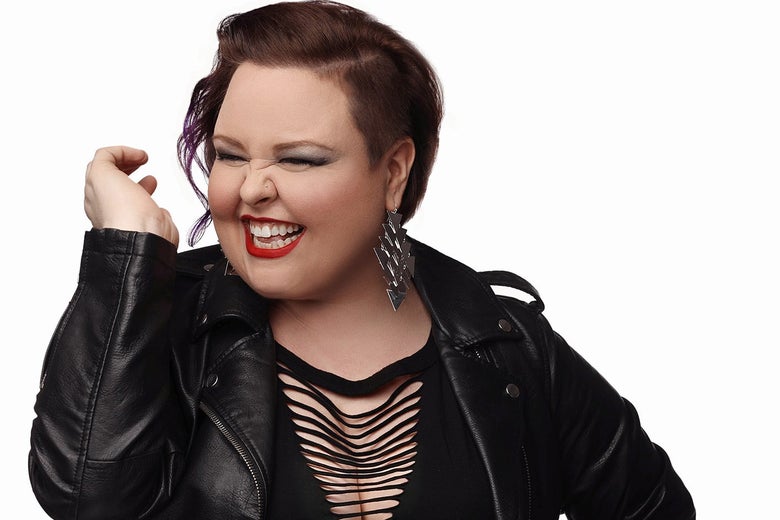
Jamie Barton.
BreeAnne Crowdus
On this week’s episode of Working, June Thomas spoke with mezzo-soprano Jamie Barton. They discussed all the expenses soloists have to cover, opera singers’ peculiar schedules, and shopping for gowns. This partial transcript of their conversation has been edited and condensed for clarity.
June Thomas: Last fall you played the title role of Orfeo in the Metropolitan Opera’s production of Orfeo ed Euridice. How much time did you spend preparing for that?
Jamie Barton: We rehearsed for about three weeks, but that’s just the tip of the iceberg. Opera singers have to show up on the first day of rehearsal with the opera completely memorized, which is a lot of work when you’re singing in a language that isn’t your own. And you’re not just singing in that language, you’re also storytelling. My personal goal is that if I’m singing in somebody’s native tongue, they won’t be distracted by the fact that I’m not a native speaker.
So it takes a long time to get the words and music in, develop the character, and stay flexible. When you go in for that first day of rehearsal, the director could have completely different ideas about who your character is, or it could be a concept production. That production at the Met wasn’t exactly a traditional Orfeo. My character was based on Johnny Cash. So, I’m not just a woman onstage playing a man; I’m a woman onstage playing Johnny Cash.
All that preparation is two months of solid work. And by solid work, I mean getting up in the morning, sitting down at the piano, and trying to memorize a book in a different language.
I think it’s fair to say that you are famous for your interpretative skills and your acting. In opera, you’re often acting in different languages. How do you do that?
Opera singers have to do a lot of education, and one of the first classes they put us in is for diction. As an undergrad, those are usually the main languages we sing in—English, German, French, Italian. If you’re really lucky, maybe Russian. But then there are other languages that aren’t standard, and so you don’t really get a full class in those. Whenever I’m approaching a language that I don’t already have some sort of familiarity with, I reach out to diction coaches that specialize in those languages. For instance, the first time I was going to be doing Dvorak’s Rusalka, I took the opportunity to learn the Dvorak gypsy songs in Czech, because I knew that I was going to do them in recitals. I knew it would be great to get used to the language before I actually hit the stage at the Metropolitan Opera singing one of the most iconic mezzo roles, Jezibaba.
You have to pay for those diction coaches, right? That’s not typically part of the what is covered by the opera company where you’ll be singing a particular role?
When you’re in prep mode, you’re paying for everything. As a freelancer, I’m paying for my voice lessons. If I need to work with a pianist to help me solidify getting something in my brain, I’m paying for that. Working on diction, I’m paying the coaches for that. There are a lot of expenses that go into preparing something to arrive for the first day of rehearsal and be in a working place.
That being said, opera companies almost always employ diction coaches for the run of the show. Those people will be in the room with us in real time, taking notes on what we can do better, helping coach us through it.
Operas are often long, so I imagine you finish work quite late. When do you eat?
We get off work at 11 p.m. or midnight or sometimes even later than that if it takes a while to get out of makeup. And remember, people who work a normal 9 to 5 don’t go to bed at 6. You’ve got to decompress. You’ve got to have dinner. So during performances, I’m often up until 4 a.m.
But the performance schedule is just part of it. Rehearsals at the Metropolitan Opera, for example, take place between about 10 a.m. and 5:30 p.m. So during rehearsals, I have to get up around 7 or 8 to be able to warm up, get some breakfast, look presentable, and get to work. When we get to final dress rehearsals and anything on stage, we start around 10:30 in the morning, but we’ve got to get there an hour and a half earlier to be able to get into hair and makeup. So I’m showing up to work at the Metropolitan Opera at about 8:30 or 9 a.m. Then comes the performance period, which knocks us into night owl mode. On top of that we’re flying all over the world, trying to shift our body clocks to wherever we are. I’m telling you, my body has no idea what time it is.
The eating thing is really subjective. Different opera singers need different things. I prefer not to eat before a performance. My diaphragm is pushing everything up; it’s just a lot more comfortable to not have food in there. I prefer to eat after the show. I’ll have a pretty big late lunch that will last me well through the show. If I’m doing a really long show, then I bring snacks. I usually bring dried fruit or nuts and plenty of water. I stay away from bubbly water because, you know, burping, which literally stops the sound!
To listen to the full episode of Working, click the player below or subscribe wherever you get your podcasts.
from Slate Magazine https://ift.tt/3cSiTi8
via IFTTT
沒有留言:
張貼留言